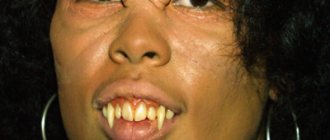Hydrophobia is one of the most common phobias today. Fortunately, with proper treatment, in most cases this disease goes away.
Despite all the achievements of mankind, man still remains a vulnerable being, who is inherently afraid of certain things and conditions. Today, there are a huge number of phobias that in one way or another prevent people from living a full life. One such phobia is the fear of water.
What is hydrophobia
Hydrophobia (aquaphobia) is the fear of water. It occurs 3–4 times more often among children than among adults. For most people, aquaphobia manifests itself as a fear of swimming. However, depending on the causes and stage of development of the phobia, people may be frightened by the sight of a river or a trickle of water, the sound of rain, or the feeling of drops on their body. For some, even taking a shower, washing your face and washing your hands becomes an alarming event. And some are even afraid to take a glass of water.
It is important! Most often, aquaphobes experience fear of swimming. They feel like the water is suffocating them. A person is afraid of choking or drowning, or getting entangled in algae.
Why does rabies cause a fear of water?
Many people wonder how rabies and fear of water are connected in principle? In fact, there is nothing in common between this disease and hydrophobia in the sense in which we perceive it.
- People with rabies are really very afraid of water. Moreover, they are so afraid that they cannot even stand the sight of it, they cannot hear it dripping. The rooms in which there are people suffering from rabies are arranged in such a way that in no case should the patient be disturbed even by the thought of water.
- In such wards there are no washbasins or sinks, the heating system is turned off or works in such a way that you cannot hear the sound of water. The dropper is wrapped with cloth so that the patient does not see that he is being injected with liquid and does not hear the slightest dripping.
- The slightest contact with water leads the patient into a state of terrible panic and hysteria . The person becomes ill and hallucinations may appear.
Hysterics
- Experts say that even a simple glass of water can cause a person to experience convulsions, and spasms of the larynx and pharynx can even lead to death.
- Why is this happening? Because the virus that causes rabies attacks the nucleus of one of the cranial nerves. At the same time, a person begins to perceive any irritating factors more acutely. There is also a thirst center , which is responsible for our desire to drink.
- During this illness, due to increased sensitivity to irritants, this center does not work entirely correctly and any attempts by the patient to drink water end in the occurrence of spasms of the upper respiratory tract. Actually, this provokes suffocation of the patient.
- From all of the above, we can conclude that such hydrophobia does not need to be treated, since it does not make any sense. In this case, hydrophobia (in combination with other characteristic manifestations of the disease) is a confirming fact that the person has rabies.
If you suffer from a fear of water, be sure to consult a specialist; after getting rid of your phobia, your life will sparkle with new bright colors.
Symptoms and types of hydrophobia
Each of the named fear varieties of hydrophobia has its own name:
- dipsophobia – fear of drinking water;
- bathophobia – fear of deep bodies of water;
- Ablutophobia – fear of hygiene procedures in the bathroom;
- potamophobia – fear of fast currents, whirlpools;
- Thalassophobia – phobia of the sea;
- limnophobia – fear of lakes;
- anthlophobia – fear of floods;
- chionophobia – fear of snow;
- Ombrophobia – fear of getting caught in the rain.
All varieties have similar psychophysiological symptoms.
On a psychological level
The main indicator is fear of water in any of its manifestations. How else does aquaphobia manifest itself on a psychological level:
- increased anxiety when drinking, entering water, approaching water, or at the thought of contact with water (depending on the stage);
- delaying hygiene procedures;
- reluctance to wash and bathe;
- increased excitability, nervousness on the beach and in other places near water;
- making up excuses to avoid going swimming or getting caught in the rain;
- panic when drops of rain or snow hit the skin;
- obsessive negative thoughts about possible tragedies.
A person tends to fantasize and come up with unfavorable scenarios for the development of events.
On the physical level
Physical signs are nonspecific:
- tachycardia;
- hyperhidrosis;
- breathing problems;
- hypertension;
- feeling of dry mouth;
- convulsions;
- clouding of consciousness;
- dyspnea;
- tinnitus;
- tremor of the limbs;
- frequent urination;
- muscle aches;
- icing of extremities;
- dizziness;
- disorientation.
How to recognize a phobia
The fear of water does not always have a mental cause. There are often accidents that result in people drowning. Then, on a physical level, the body remembers the situation and all the visual and tactile objects associated with it.
Unlike rabies, hydrophobia does not have symptoms such as delusions, photophobia and hallucinations. A phobia of water is not fatal. It's just a mental disorder. It’s better not to joke with rabies; if you have the first signs of it, you should definitely consult a doctor.
Aquaphobia includes psychological and vegetative symptoms.
At the mental level, the following symptoms exist:
- a person does not like it when water comes into contact with his skin;
- he is afraid of depth and open waters;
- the individual panicky does not want to swim or bathe.
Also, if there is snow or a thunderstorm outside, the phobia of water manifests itself in the form of a fear of leaving the room. The rarest cases include anxiety regarding the use of liquids inside the body.
At the physical level, water phobia manifests itself as follows:
- a person feels sick;
- dizzy;
- constant headache;
- pressure rises.
Please note that fear of water can cause profuse sweating.
If left untreated, an aquaphobe may experience panic attacks if they go far into the water. Seizures and other somatic symptoms often occur. A person’s consciousness tends to turn off in such situations; he no longer controls his thoughts and actions. At this moment, life may be at risk. It is important to overcome your phobia of water at the earliest stages.
Main causes of phobia
All varieties have common psychological and somatic prerequisites.
The most common stressful situations are:
On average, fear of water develops at 3–5 years of age and persists thereafter. That is, adult fears, as a rule, come from childhood. In turn, in childhood, fear of water may appear for the following reasons:
- injuries in the form of attempted drowning of a child or someone’s death before his eyes;
- extreme methods of teaching swimming that frightened the child or caused physical injury;
- punishment with water, child abuse;
- personal negative experience with water (frostbite, burns, fear, pain, unpleasant tingling of the eyes, etc.);
- convulsions that occurred while the child was in the water;
- parents misunderstanding the child’s fears and forcibly pushing him into the water;
- improper bathing of the child (hot or cold water, sudden immersion in the bath);
- improper child care (wet diapers).
Childhood psychotrauma may be indirectly related to water. For example, one of the parents died when it was raining outside. Or mom and dad had a big fight while the family was on the beach. Or an angry parent splashed cold water on a child. And so on.
In adulthood, aquaphobia can develop after violence near or using water, after the death of a loved one in the water, after a seizure or other unpleasant situation that happened in the water. And also if a person had to survive a natural disaster.
Both in childhood and among adults, impressionable people are at risk. Such a person may develop a phobia, fear of water, after watching a film about a water disaster or after watching horror and thrillers with scenes of violence. Or after news of someone drowning, shark attack, etc.
This is interesting! Among the physical prerequisites for hydrophobia are rabies and tetanus, fetal hypoxia during pregnancy, and throat diseases that interfere with drinking water. When contracting rabies, hydrophobia (fear of water) is one of the symptoms.
The most common occurrence: surviving an accident
No one is insured against an accident. And even if everything ends well, the memory of what happened will haunt the person for the rest of his life.
Examples of situations and accidents:
- drowning while swimming;
- shipwreck;
- choking on water while eating;
- natural disasters (storm, snow drift);
- thunderstorm (scares children, fear transfers to any situation involving water);
- a person does not feel the bottom while swimming.
The risk of developing a phobia increases if an accident occurred in childhood. Sometimes a fear of water at this age can develop against the background of a fictitious accident. Children under 6 years of age are prone to fantasizing, and they themselves can be frightened by their own made-up stories.
Fear of water - how to overcome fear: treatment methods for adults
- For many people suffering from hydrophobia, it seems that it is simply impossible to overcome this fear. In fact, all problems are only in our heads and it is possible to recover from this phobia. Another thing is that this process requires great desire, perseverance and perseverance. Also, a person must understand that this process is time-consuming.
- It is worth noting that the fear of water can be either permanent or temporary, occurring periodically. Depending on how negatively the presence of a phobia affects a person’s life, a method of getting rid of it is chosen.
- Most often, treatment consists of working with the head, personal experiences, and stressful situations that have occurred in the patient’s life. Drug treatment is used quite rarely and more as an additional therapy. In this case, the doctor may prescribe sedatives , which will relax the person, calm his nervous system, and eliminate the symptoms of panic attacks.
- The main work on a phobia lies in the psychological impact on it. Please note that it is not the phobia itself that needs to be eliminated, but the reasons that provoked its appearance.
It is important to overcome fear.
That is why working with a psychologist or psychotherapist in this case gives the most positive results:
- First, the specialist finds out what triggered the fear of water, analyzes these reasons, and only after that chooses the most effective way to combat them. And, of course, methods of work are always individual, since what works well for some may be completely useless for others.
- Sometimes specialists resort to the “visualization” method. Initially, a person is shown various pictures with the source of his fear, he is taught to control his state (breathe calmly, listen to the heartbeat, reason adequately).
- After a person copes with this task, the psychotherapist moves on to the next stage, direct contact with water. In this case, a person is taught to understand what specifically frightens him, he pronounces all the sensations that he feels upon contact with the irritant, after which he is taught to control himself in the water, and is helped to get rid of panic and stress.
- Sometimes a person suffering from this phobia is asked to write a list of all the unpleasant and dangerous situations related to water that have ever happened in his life. After this, it is worth considering each situation, analyzing your state at this time and your actions. Next, understand what exactly you did wrong and understand exactly how you should have acted. After this, you need to assess the real risks in current situations, because often there are simply none. For some, this kind of self-analysis helps quite well.
- Experts also recommend that patients imagine themselves in a “stimulating” situation (at depth, in water, near large objects in the water) and try to adjust their perception of the situation. Also at this time, it is important to work with manifestations of the phobia: adjust your breathing, try to remain calm, etc.
- Hypnosis is considered to be the most effective way to combat phobias . Thanks to this effect on consciousness, the specialist finds out the true reasons for fear, instills in his patient that in fact there are no real reasons to be afraid of water, that water cannot harm him in any way.
- Such treatment helps the patient stop constantly thinking about his phobia, relieves him of the fear, anxiety, panic and hysteria that he feels when he sees the source of the fear. Over time, a person begins to look differently at what previously caused him discomfort and fear, and begins to see the positive in the source of fear.
Hypnosis can help
- In our case, the patient begins to understand that water can bring not only anxiety and troubles, but also pleasure , that you can enjoy swimming, bathing in the water, and having a great time with friends by the river. Gradually, a person’s thinking completely changes and the phobia, as a rule, recedes
It is worth understanding that treatment with hypnosis is completely painless and safe.
- However, we are talking only about the case if we are talking about a highly qualified specialist, and not a charlatan, of whom, unfortunately, there are a lot.
- Based on this, try to find a good specialist, read reviews about him and his work, estimate the cost of services (the services of a qualified specialist are not cheap) and only then seek help
Features of hydrophobia in adults and children
Treatment of adults and children is not much different. In both cases, it is necessary to determine the cause of fear and teach the person techniques for coping with stress. Only the methods of psychotherapy differ.
Freeing children from phobias
How to help your child at home:
- in the form of a game and in a pleasant psychological environment, bring the aquaphobe to water;
- create a favorable psychological atmosphere in the house (all children's fears appear due to general tension and anxiety);
- show by the example of other children and adults what joy swimming and relaxing in a water park brings;
- arrange a bath with oils and aromatic candles.
You can get rid of fear through indirect contact with water, for example, come up with a fairy tale in which a child overcomes his fear or saves someone from the water. Art therapy is effective in childhood. You can visualize the fear of water and play a scene or depict in a drawing how a child overcomes his fear.
What is prohibited to do:
- force a child to go into the water;
- forcibly bathe a child, drag him into water;
- shout and punish.
It is important! Most childhood fears go away on their own over time. If a child cannot overcome his fear of water, then it is necessary to consult a psychologist.
Helping adults overcome their fear of water
To get rid of hydrophobia yourself, follow the following plan:
- Try to determine what situation started the phobia.
- Analyze this case. Think about how much of your responsibility is in what happened. What can you do now to prevent this from happening again? If this happened through no fault of yours, then you need to accept the fact that you cannot control everything.
- Make a list of scary situations. Write down each of them in detail: what exactly scares you and why.
- Master self-regulation techniques: auto-training, meditation, relaxation, breathing exercises.
- Start getting closer to the object of fear. First achieve a relaxed state, and then approach the object of fear. You can start with a photo or video of water. Then move on to real life: a walk along the river bank, a trip to the pool.
If you are afraid of drowning because you don’t know how to swim, then no matter how paradoxical it may sound, you need to learn how to do it. These days there are a lot of programs for both children and adults. You can hire a personal trainer.
It is important! You can only overcome your fear of water by facing your fear face to face. Shock therapy (an abrupt meeting) is suitable for some, while gradual rapprochement combined with relaxation is suitable for others.
Fear of water: how to get rid of hydrophobia for children?
- It is important to clearly understand that such a problem cannot be ignored under any circumstances. If your baby begins to be afraid of water, then there are serious reasons for this. First, you can try to figure them out yourself.
- Also, at the initial stage, you can try to rid your child of this phobia on your own.
To help your child say goodbye to his fear of water, follow these recommendations:
- First, eliminate the irritating factor . That is, there is no need to forcefully bathe the baby, put him in the bath, combining this with moralizing and statements that this is not scary at all. You must understand that if before the baby swam without problems and enjoyed it, but now he whines and gets out of the water screaming, it means that you missed something and now this “something” has to be recognized.
- Try to calmly find out what scared the child. Perhaps someone scared him in the water, maybe he stumbled and drank some water, getting scared, maybe he heard from someone a story about a monster that lives in the bathroom, river, sea, and can eat him. There are a lot of options, but, as in the situation with an adult, before eradicating fear, you need to understand what triggered its appearance.
Find out the reasons
- Next, act according to the situation, do not scold the baby for his fear, do not criticize, do not make fun of him. Firstly, tell him that there is nothing and no one in the water who would pose a danger to him, refer to the fact that the imam’s father (any person of authority for your child) is not afraid of water.
- Offer to go into the water together, do not drag the child into the depths. Show by personal example that you are not afraid of water and enjoy swimming. Let your child know that you will always be there for him and will help if necessary. Don't force them to do something (dive, go deeper, etc.) if the child doesn't want to.
- If possible, sign up for a pool class together. There you can learn to swim together, play at a depth where the child is comfortable, plus the pool has clean and clear water, and this is a calming factor for a child who has such a phobia.
- If a very tiny baby is afraid of water, try turning the entire bathing procedure into a game . Take soap bubbles and lots of toys to the bath, to the river, and distract your child with games. Try splashing, splashing, invite the child to splash you, while you, of course, should laugh so that the baby understands that this is not only not scary, but even fun.
Turn it into a game
- fairy tales can help get rid of such fear . Read to your child fairy tales about brave sailors and fishermen who were not afraid of water, helped others, etc. The main thing is that the fairy tales are good and do not have a scary plot with water
- If your attempts do not bring the desired result, be sure to contact a specialist. Child psychologists can help you and your child solve this problem.
- Remember that you are primarily responsible for your child, and due to his age, he will not always be able to ask for help himself and go where he can get help.
What is the help of specialists in control and prevention?
Depending on the severity of the phobia, treatment may consist of psychotherapy or treatment is provided using psychotherapy methods and medication. If the phobia of water is complicated by panic attacks, then antidepressants, tranquilizers, and sedatives are prescribed. If medication is not needed, then only psychotherapy is selected. Hypnosis, NLP, and cognitive behavioral psychotherapy are commonly used. The average course of psychotherapy is 2 months.
Psychotherapy sessions can be individual or group. The purpose of the classes is to eliminate the causes of the phobia. The specialist penetrates the client’s subconscious and reveals the deep causes of fear. Next, work is carried out to change the attitude towards past experience and correct perception, teaching the client relaxation methods.
Additionally, work is carried out to correct a person’s self-perception and character. It is necessary to increase self-confidence, to rid the client of suspiciousness and anxiety, and excessive impressionability.
It is important! Only a psychotherapist can determine the course of treatment and, if necessary, prescribe medications. Only a specialist can accurately determine the cause and living conditions, personality traits that are prerequisites for the development of a phobia.
Let's learn not to be afraid in the pool
After completing the first four steps to overcome your phobia, you can sign up for water aerobics or swimming in our pool. We have an experienced trainer with about 20 years of experience in water aerobics. For those who sign up for individual training, a specialist will develop a personal set of exercises that will first help overcome fear, and then completely comprehend the art of swimming. We conduct sessions for both adults and young clients, for whom we organize play-based activities, which greatly helps them relax and overcome panic.











